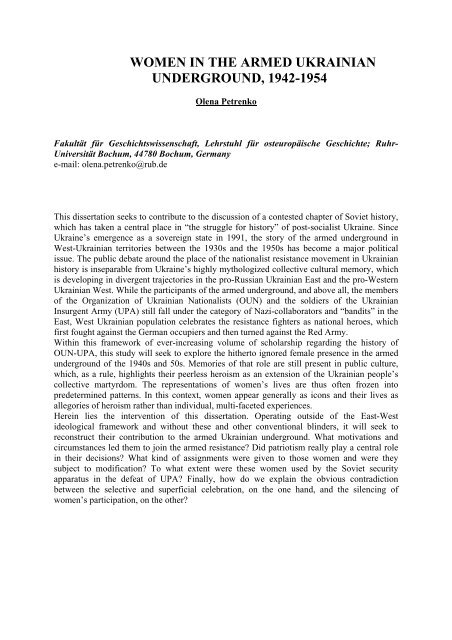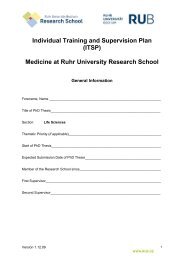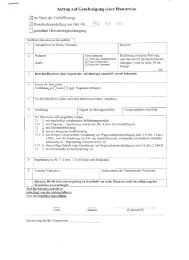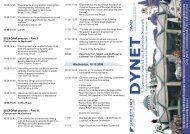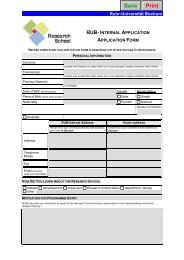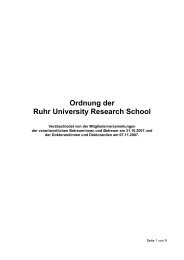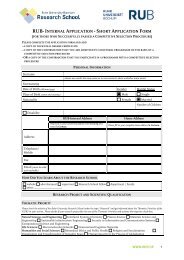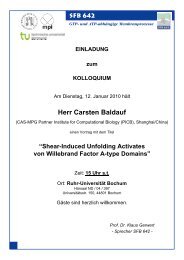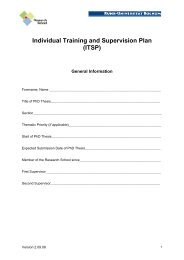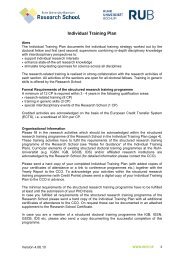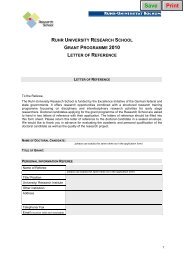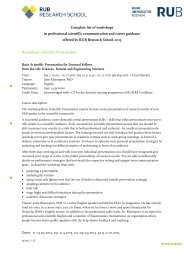Section Days abstract book 2010.indd - RUB Research School ...
Section Days abstract book 2010.indd - RUB Research School ...
Section Days abstract book 2010.indd - RUB Research School ...
You also want an ePaper? Increase the reach of your titles
YUMPU automatically turns print PDFs into web optimized ePapers that Google loves.
WOMEN IN THE ARMED UKRAINIAN<br />
UNDERGROUND, 1942-1954<br />
Olena Petrenko<br />
Fakultät für Geschichtswissenschaft, Lehrstuhl für osteuropäische Geschichte; Ruhr-<br />
Universität Bochum, 44780 Bochum, Germany<br />
e-mail: olena.petrenko@rub.de<br />
This dissertation seeks to contribute to the discussion of a contested chapter of Soviet history,<br />
which has taken a central place in “the struggle for history” of post-socialist Ukraine. Since<br />
Ukraine’s emergence as a sovereign state in 1991, the story of the armed underground in<br />
West-Ukrainian territories between the 1930s and the 1950s has become a major political<br />
issue. The public debate around the place of the nationalist resistance movement in Ukrainian<br />
history is inseparable from Ukraine’s highly mythologized collective cultural memory, which<br />
is developing in divergent trajectories in the pro-Russian Ukrainian East and the pro-Western<br />
Ukrainian West. While the participants of the armed underground, and above all, the members<br />
of the Organization of Ukrainian Nationalists (OUN) and the soldiers of the Ukrainian<br />
Insurgent Army (UPA) still fall under the category of Nazi-collaborators and “bandits” in the<br />
East, West Ukrainian population celebrates the resistance fighters as national heroes, which<br />
first fought against the German occupiers and then turned against the Red Army.<br />
Within this framework of ever-increasing volume of scholarship regarding the history of<br />
OUN-UPA, this study will seek to explore the hitherto ignored female presence in the armed<br />
underground of the 1940s and 50s. Memories of that role are still present in public culture,<br />
which, as a rule, highlights their peerless heroism as an extension of the Ukrainian people’s<br />
collective martyrdom. The representations of women’s lives are thus often frozen into<br />
predetermined patterns. In this context, women appear generally as icons and their lives as<br />
allegories of heroism rather than individual, multi-faceted experiences.<br />
Herein lies the intervention of this dissertation. Operating outside of the East-West<br />
ideological framework and without these and other conventional blinders, it will seek to<br />
reconstruct their contribution to the armed Ukrainian underground. What motivations and<br />
circumstances led them to join the armed resistance? Did patriotism really play a central role<br />
in their decisions? What kind of assignments were given to those women and were they<br />
subject to modification? To what extent were these women used by the Soviet security<br />
apparatus in the defeat of UPA? Finally, how do we explain the obvious contradiction<br />
between the selective and superficial celebration, on the one hand, and the silencing of<br />
women’s participation, on the other?


